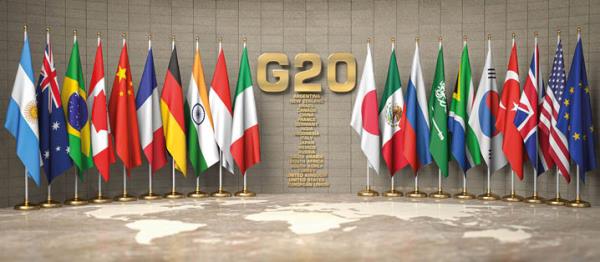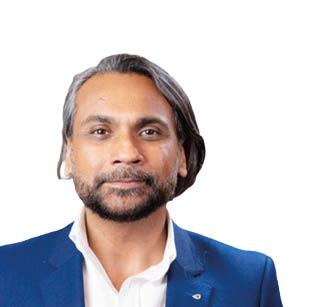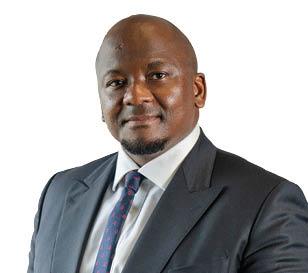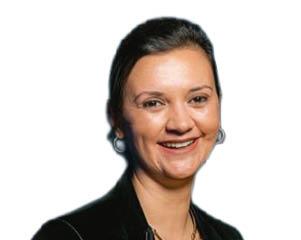07 October 2025

The G20’s arrival in Africa isn’t just symbolic — it’s a once-in-a-generation chance to hardwire the continent into the global digital economy. With more than 600 million people still offline, leaders and industry players argue that universal connectivity must be treated as infrastructure, not luxury.
When the G20 gathers in Africa for the first time in November 2025, the symbolism will be powerful. But for African telecom leaders, symbolism is not enough. The continent faces the largest digital inclusion challenge of the 21st century: connecting more than 600 million people who remain offline, most of them in rural and low-income areas. Without decisive action, Africa risks deepening the digital divide just as the rest of the world moves into the 5G and 6G eras.

Danial Mausoof,
Nokia
“This is about positioning universal connectivity as a core development priority,” says Andy Dikobo, Public Sector Executive at NTT DATA in the Middle East and Africa. “By advocating for funding, regulatory harmonization, and public-private partnerships, Africa can attract investment and scale infrastructure. Emphasising 4G for mass inclusion while deploying 5G in strategic zones will ensure balanced growth.”
The G20 provides a rare platform: it unites the world’s largest economies with multilateral lenders, regulators, and technology companies. For the first time, Africa will chair those discussions — and that means it can put the continent’s connectivity challenge at the top of the global agenda.
Connectivity as infrastructure, not luxury
The first step, argue industry leaders, is to reframe connectivity. Too often, it is seen as a telecoms industry problem, or a matter of consumer convenience. But Africa’s case is stark: without networks, everything else — from education and healthcare to digital payments and e-commerce — remains out of reach.

Andy Dikobo, NTT
“We need to frame connectivity as a foundational enabler of inclusive growth,” insists Danial Mausoof, Vice President of Technology, Solutions and Services at Nokia in MEA. “By embedding wireless infrastructure goals into the G20 digital inclusion mandate, Africa can push rural 4G/5G deployment alongside clean water and energy access.”
This argument resonates with policymakers because the evidence is compelling. A 2023 World Bank study found that every 10% increase in broadband penetration in low- and middle-income countries boosts GDP growth by 1–2%. Ericsson research shows that a 10% increase in school connectivity alone can lift GDP per capita by more than 1%.
“It is time to stop thinking of connectivity as a consumer service,” says Majda Lahlou Kassi, Vice President and Head of Ericsson West and Southern Africa. “It is critical infrastructure. Without it, digital transformation cannot happen.”
The numbers illustrate both progress and the scale of the challenge. According to GSMA’s 2024 Mobile Economy report:
- Mobile penetration across sub-Saharan Africa has reached 49%
- But only 22% of mobile users are connected to 4G
- 5G adoption remains below 1% across most of the continent
- Nearly 600 million people remain offline entirely, mainly in rural areas
The urban-rural divide is particularly acute. In Lagos or Nairobi, consumers enjoy high-speed 4G and even pilot 5G services. But in much of the Sahel, central Africa, and remote coastal regions, even 2G voice coverage is patchy.
“This unevenness creates a two-speed Africa,” says Mausoof. “Urban elites move forward with digital tools while rural populations risk being excluded from the modern economy altogether.”
Cutting deployment costs
Part of the reason is cost. Extending 4G or 5G coverage into sparsely populated, low-income areas often makes little commercial sense for operators. But new approaches are changing the equation.
“Our analysis shows that smart rural base stations, AI-driven planning, and zero-footprint energy systems can cut rollout costs by up to 40% in rural Africa,” explains Mausoof. “These solutions are not theoretical. They are being deployed today.”
One promising model is Radio-as-a-Service (RaaS), where a neutral host builds and manages base stations that multiple operators can use. This shared approach allows carriers to expand coverage without bearing the full cost. Ghana’s Next-Gen Infrastructure Company (NGIC) is an early example, pooling operator resources to deploy 4G networks nationwide.
Ericsson has focused on sustainability and affordability: “our solar-powered rural site solutions show that even in remote areas, cellular solutions based on 4G and 5G are the most cost-efficient, future-proof and scalable,” says Kassi. “The technology exists — the challenge is scaling it.”
Fixed Wireless Access (FWA) is another game-changer. By using 4G or 5G to deliver home broadband via wireless rather than fibre, operators can connect households at a fraction of the cost of trenching cables. GSMA predicts that by 2030, FWA will account for over 40% of broadband connections in Africa.
However, even with smarter deployment models, investment remains the bottleneck. Rolling out universal connectivity in Africa is estimated to cost $100–150 billion over the next decade. No single operator, or even national government, can shoulder that.
“Africa can leverage the G20 to accelerate deployment by advancing targeted policy advocacy, coordinated investment, regulatory harmonisation, and innovative public-private partnerships,” says Sunil Geness, Director of Global Government Affairs & CSR Africa at SAP. “The G20 unites leading economies, multilateral development banks, and significant technology stakeholders. That creates opportunities to unlock financing and technical expertise for Africa’s digital infrastructure.”
Mausoof advocates for blended finance models: “Universal Service Funds can be matched with private investment to de-risk rural deployments. Development banks can provide concessional loans to make marginal projects viable.”
This is not theoretical. The World Bank’s Digital Economy for Africa Initiative (DE4A) has already mobilised billions to support connectivity. The African Development Bank’s Digital Moonshot plan aims to achieve universal broadband access by 2030. The challenge, industry voices say, is to bring these efforts under a unified G20-backed framework.
“Global bodies like the ITU estimate that connecting the remaining unconnected population will require more than $400 billion by 2030,” says Kassi. “But the return is clear. Without this investment, Africa risks being left behind in the digital economy.”
Policy, regulation and spectrum
Money is only part of the story. The regulatory environment must also encourage investment and innovation to strengthen national security, economic prosperity, and social stability – a concept known as techno-nationalism.
“As techno-nationalism intensifies, African nations must take a proactive stance at the G20 to advocate for open and equitable wireless spectrum policies and cross-border data frameworks,” argues Dikobo. “NTT DATA recommends that African leaders push for transparent spectrum auctions, regional harmonisation of frequency bands, and interoperable data governance models. These steps are essential to ensure seamless digital connectivity across borders and to empower local innovation without geopolitical constraints.”
According to Kassi, techno-nationalism risks fragmenting the global digital ecosystem.
“…and Africa has a strategic interest in keeping it open, fair and interoperable. At the G20, African leaders can speak with a unified voice to promote policies that prioritise technology neutrality, harmonised spectrum allocation and secure cross-border data flows,” says Kassi. “Fair access to spectrum is foundational. We have long advocated for future-proof, investment-friendly spectrum frameworks that encourage innovation and reduce deployment barriers. Across the continent, many governments are already working with partners like the African Telecommunications Union (ATU) to align policies and unlock more spectrum for mobile broadband. Bringing these efforts and cooperative mindset to the G20 table can help scale that alignment, attract investment and accelerate rollout.”
Mausoof believes that, at the G20, African nations should:
- Advocate for technology-neutral spectrum policies that prioritise performance, energy efficiency, and openness — enabling flexible models like AnyRAN, which allow operators to integrate multi-vendor systems seamlessly.
- Promote shared spectrum frameworks for rural coverage and emergency services – a big miss on the entire continent today.
- Establish cross-border digital corridors, supported by harmonised data privacy regulations and regional cloud/data centre strategies.
“Africa must unite as a single digital voice, pressing the G20 to safeguard open architecture standards and non-discriminatory access to next-gen tech,” confirms Mausoof.
Geness agrees: “by presenting a united front via the African Union and regional economic communities, Africa can negotiate from a position of strength at global standard-setting organisations and G20 dialogues.”
Advocating for digital trust
Maeson Maherry, Chief Operating Officer, Ascertia

Maeson Maherry, Chief Operating Officer, Ascertia
While the expansion of 4G and 5G networks across Africa is a powerful enabler — bringing entire communities online and opening access to education, healthcare, financial services, and government programs. But faster connectivity alone won’t deliver the full promise of digital transformation. What’s needed alongside it is an equally strong investment in digital trust infrastructure.
As more services move online, it becomes essential to ensure that every digital interaction is authentic, secure, and accountable. This is where digital signatures and distributed digital identities come into play. A compelling example is the mobile electronic national ID (eID) and mobile driver’s license (mDL) — secure, verifiable digital identities that can be used to access services, prove identity, and authorise transactions, all from a smartphone.
Of course, for digital trust to be truly inclusive, it must be accessible. That means coupling high-speed networks with the availability of low-cost, yet secure, smartphones—devices that support cryptographic security and protect user data by design. Without this, we risk widening the gap rather than closing it.
Africa has a unique opportunity to leapfrog outdated systems by pragmatically adopting proven global standards. The European Union has invested heavily in building interoperable digital trust frameworks — from eIDAS-compliant digital signatures to cross-border identity assurance. These technical and regulatory standards can be adapted to local realities, enabling African nations to accelerate time-to-value while ensuring legal reliability and user confidence.
Africa’s digital future will be shaped not just by how many are connected, but by how much those connections can be trusted.
The G20 is our moment

Majda Lahlou Kassi, Ericsson
Ultimately, the argument for universal connectivity is not just economic. It is about human potential.
“Priority sectors like telemedicine, remote education, and digital commerce all thrive on low-latency, secure, and resilient wireless networks,” says Mausoof. “The G20 should ensure that infrastructure financing earmarks wireless-specific windows — especially in universal service and climate resilience funding.”
The pandemic made this point painfully clear. In countries like Kenya and Nigeria, students in urban areas could continue learning online, while rural peers were left behind. Telemedicine pilots showed promise in cities but struggled in areas with weak networks.
“The simple truth is: there is no digital transformation without connectivity,” says Kassi. “If G20 infrastructure finance overlooks wireless networks, it risks missing the foundation for progress across every other sector.”
The African Union’s Digital Transformation Strategy provides the roadmap: universal access to affordable broadband, harmonised spectrum policy, and digital skills for all. The question is whether Africa can use the G20 to accelerate delivery.
“We already have the right technologies for the region — now we need investment to scale them,” says Kassi.
For Dikobo, the path forward is clear: “by advocating for funding, regulatory harmonisation, and innovative partnerships, Africa can attract investment and scale infrastructure. The G20 is the ideal platform to position these priorities globally.”
“Through smart regulation, targeted investment, and continental unity, Africa can lead — not follow — the global digital agenda. G20 2025 is our moment,” concludes Mausoof.







